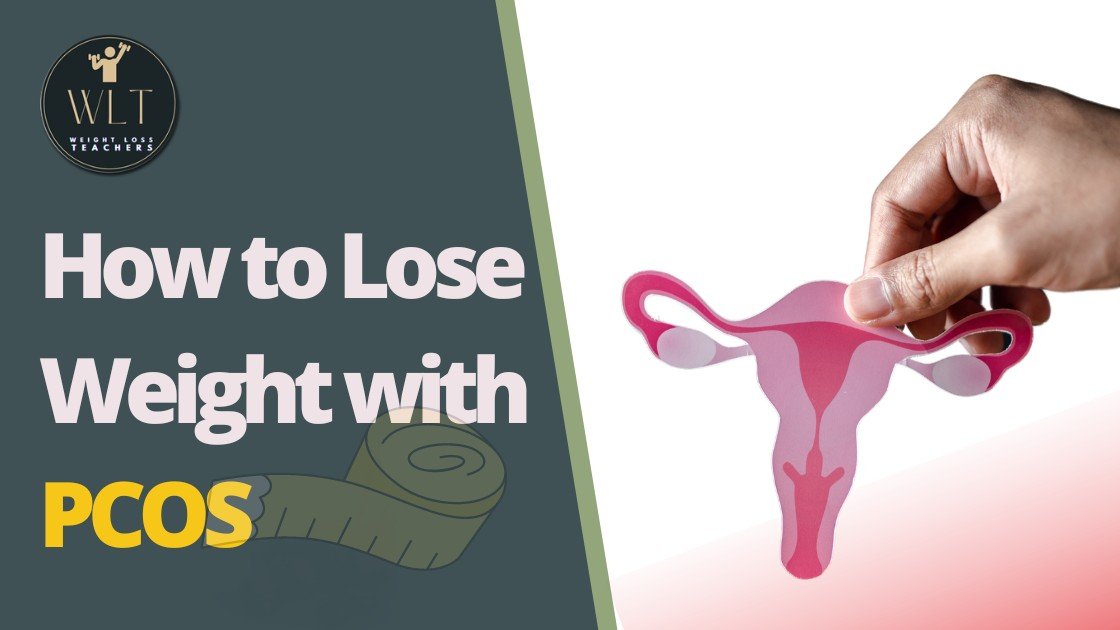
How to Lose Weight with PCOS
Polycystic ovary syndrome (PCOS) is a complex hormonal disorder that affects many women. It presents a range of symptoms, including irregular menstrual cycles, infertility, acne, excess hair growth, weight gain, and insulin resistance.
Struggling with weight loss due to PCOS? You’re not alone. Polycystic Ovary Syndrome (PCOS) can make losing weight more challenging, but with the right approach, it’s entirely possible. By focusing on a balanced diet, specific exercise routines, and essential lifestyle changes, you can manage PCOS symptoms and achieve your weight loss goals. Discover effective strategies to lose weight with PCOS and improve your overall health and well-being. Let’s break down the steps that can make a significant difference in your journey!
How to Lose Weight with PCOS
PCOS and Its Link to Weight Gain

1.1 Understanding PCOS
Polycystic ovary syndrome (PCOS) is a complex hormonal disorder that affects the reproductive system in women. It is characterized by the presence of multiple cysts on the ovaries, irregular menstrual cycles, and an imbalance of reproductive hormones. While the exact cause of PCOS is unknown, it is believed to be influenced by both genetic and environmental factors.
1.2 Symptoms of PCOS
PCOS presents a range of symptoms that can vary from woman to woman. The most common symptoms include irregular menstrual cycles, which may be longer or shorter than normal, or absent altogether. Infertility is also a common issue for women with PCOS due to irregular ovulation. Other symptoms include acne, excess hair growth (hirsutism), and thinning hair on the scalp (male-pattern baldness). Weight gain is another prevalent symptom of PCOS, and it can be particularly challenging for women to manage.
1.3 The Connection Between PCOS and Weight Gain
Weight gain is a significant challenge faced by many women with PCOS. While the exact mechanisms behind the relationship between PCOS and weight gain are not fully understood, several factors contribute to this connection. One key factor is insulin resistance. Insulin is a hormone that regulates blood sugar levels, and when the body becomes resistant to insulin, it leads to elevated blood sugar levels. Insulin resistance can cause the body to store fat more easily, leading to weight gain.
In addition to insulin resistance, inflammation may also play a role in PCOS-related weight gain. Chronic inflammation, which is an immune system response, can contribute to insulin resistance and weight gain. Studies have shown that women with PCOS tend to have higher levels of inflammation compared to women without the condition.
Furthermore, hormonal imbalances associated with PCOS can disrupt the normal functioning of the metabolism and lead to weight gain. Elevated levels of androgens (male hormones) in women with PCOS can contribute to increased fat storage, particularly in the abdominal area. This pattern of fat distribution is known as central obesity, which is associated with an increased risk of metabolic disorders such as diabetes and cardiovascular disease.
1.4 Contributing Factors to Weight Gain in PCOS
Several contributing factors contribute to weight gain in women with PCOS. These factors include:
1.4.1 Insulin Resistance:
As mentioned earlier, insulin resistance is a hallmark of PCOS and can lead to weight gain. When the body becomes less sensitive to insulin, it struggles to regulate blood sugar levels effectively. This leads to an increase in insulin production, which promotes fat storage and hinders weight loss efforts.
1.4.2 Hormonal Imbalances:
Imbalances in reproductive hormones, including elevated levels of androgens such as testosterone, can disrupt metabolic processes and promote weight gain. Androgens play a role in fat storage and can contribute to the development of insulin resistance.
1.4.3 Disrupted Hunger and Satiety Signals:
Women with PCOS may experience dysregulation in hunger and satiety signals, leading to increased food intake and cravings. This can make it challenging to adhere to a calorie-controlled diet and contribute to weight gain.
1.4.4 Psychological Factors:
PCOS can also have psychological effects, such as increased stress levels, anxiety, and depression. These emotional factors can contribute to emotional eating and a reliance on food as a coping mechanism, leading to weight gain.
1.4.5 Genetic Predisposition:
While the precise genetic factors underlying PCOS-related weight gain are not fully understood, research suggests that there may be a genetic predisposition to weight gain in women with PCOS.
1.5 Prevalence of Insulin Resistance and Inflammation in PCOS
Insulin resistance is a common metabolic abnormality in PCOS, affecting approximately 70-80% of women with the condition. Insulin resistance impairs the body’s ability to use insulin effectively, resulting in elevated blood sugar levels and increased fat storage. This contributes to weight gain and makes it more challenging for women with PCOS to lose weight.
Inflammation is another prevalent issue in PCOS, and women with the condition often have higher levels of inflammation compared to women without PCOS. Chronic inflammation can promote insulin resistance, disrupt hormonal balance, and contribute to weight gain. Addressing inflammation through lifestyle modifications, such as a healthy diet and regular exercise, can help mitigate the impact of inflammation on weight management in PCOS.
Understanding the prevalence and significance of insulin resistance and inflammation in PCOS is crucial for developing effective weight loss strategies. By targeting these underlying factors, women with PCOS can better manage their symptoms and achieve their weight loss goals.
Strategies for Weight Loss with PCOS

2.1 Importance of a Healthy, Balanced Diet
Adopting a healthy, balanced diet is essential for weight loss and managing PCOS symptoms. A balanced diet provides the body with the necessary nutrients while promoting stable blood sugar levels and reducing inflammation. Here are some key dietary considerations for women with PCOS:
2.1.1 Macronutrient Composition: Protein, Fiber, and Healthy Fats Including adequate amounts of protein, fiber, and healthy fats in the diet are crucial for weight loss with PCOS. Protein helps promote satiety, preserves lean muscle mass, and supports a healthy metabolism. Good sources of protein include lean meats, fish, tofu, beans, and lentils.
Fiber-rich foods, such as fruits, vegetables, whole grains, and legumes, help regulate blood sugar levels, promote feelings of fullness, and aid in the digestion. They also contribute to a healthy gut microbiome, which plays a role in weight management and overall health.
Healthy fats, such as those found in avocados, nuts, seeds, and olive oil, are important for hormone production, nutrient absorption, and satiety. Including these fats in moderation can support weight loss efforts and overall well-being.
2.1.2 Managing Carbohydrate Intake: While carbohydrates are an essential part of a balanced diet, it is important to focus on complex carbohydrates with a low glycemic index (GI). Low GI foods are digested and absorbed more slowly, leading to a gradual and steady rise in blood sugar levels. This helps prevent spikes and crashes in energy levels and reduces the risk of insulin resistance and weight gain.
Choosing whole grains, such as brown rice, quinoa, whole wheat bread, and oats, over refined carbohydrates is beneficial for managing PCOS symptoms and supporting weight loss efforts. These whole grains provide more fiber and nutrients, which contribute to feelings of fullness and stable blood sugar levels.
2.1.3 Food Choices to Support PCOS Management and Weight Loss: In addition to macronutrient composition and carbohydrate management, certain food choices can specifically support PCOS management and weight loss. Some foods that may be beneficial include:
- Berries: Berries are rich in antioxidants, vitamins, and fiber. They have a low GI and can help stabilize blood sugar levels.
- Leafy greens: Leafy greens, such as spinach and kale, are nutrient-dense and low in calories. They provide essential vitamins and minerals while adding volume to meals without adding excess calories.
- Broccoli: Broccoli is a cruciferous vegetable that contains compounds with potential anti-inflammatory effects. It is also a good source of fiber, vitamins, and minerals.
- Sweet potatoes: Sweet potatoes are a nutritious carbohydrate source that provides vitamins, minerals, and fiber. They have a lower GI compared to regular potatoes.
- Lean protein sources: Including lean protein sources, such as chicken, fish, tofu, beans, and lentils, in meals can promote satiety, support muscle maintenance, and aid in weight loss.
2.1.4 Portion Control: In addition to focusing on the quality of food choices, portion control is an essential aspect of weight loss for women with PCOS. Managing portion sizes helps regulate calorie intake, control blood sugar levels, and prevent overeating. Here are some strategies for portion control:
2.1.4.1 Smaller, More Frequent Meals: Instead of consuming three large meals, consider dividing meals into smaller, more frequent eating occasions throughout the day. This approach can help regulate blood sugar levels, control hunger, and reduce the likelihood of overeating.
2.1.4.2 Using Smaller Plates and Bowls: Research suggests that using smaller plates and bowls can trick the brain into perceiving larger portions. This can help create a visual illusion of satisfaction and reduce the tendency to overeat.
2.1.4.3 Measuring Food Portions: Measuring food portions using tools such as measuring cups, food scales, or visual portion guides can provide a more accurate representation of serving sizes. This practice promotes awareness of portion sizes and helps avoid unintentional overconsumption.
2.2 Exercise for Weight Loss and PCOS Management
Regular exercise is an integral part of weight loss and managing PCOS symptoms. Exercise helps improve insulin sensitivity, burn calories, reduce inflammation, and promote overall well-being. Here are some exercise recommendations for women with PCOS:
2.2.1 Cardiovascular Exercise: Cardiovascular exercise, also known as aerobic exercise, involves activities that increase heart rate and promote cardiovascular fitness. Engaging in regular cardiovascular exercise helps burn calories, improve insulin sensitivity, and support weight loss efforts. Some suitable cardiovascular exercises for women with PCOS include:
- Walking: Walking is a low-impact exercise that can be easily incorporated into daily routines. Aim for at least 30 minutes of brisk walking per day.
- Jogging/Running: For those who are physically able, jogging or running can be effective cardiovascular exercises to promote weight loss.
- Cycling: Whether on a stationary bike or cycling outdoors, this activity provides a low-impact cardiovascular workout that can be tailored to individual fitness levels.
- Swimming: Swimming is a low-impact exercise that engages the entire body and provides a cardiovascular workout without putting stress on the joints.
2.2.2 Resistance Training: Resistance training, also known as strength training or weightlifting, involves working against resistance to build and strengthen muscles. Incorporating resistance training into an exercise routine helps increase muscle mass, which can boost metabolism and support weight loss. It is essential to focus on proper form and technique to minimize the risk of injury. Some resistance training exercises suitable for women with PCOS include:
- Weightlifting: Using dumbbells, barbells, or weight machines to perform exercises such as squats, lunges, deadlifts, and chest presses.
- Bodyweight exercises: Utilizing bodyweight as resistance for exercises such as push-ups, squats, lunges, planks, and glute bridges.
- Resistance bands: Incorporating resistance bands into workouts can provide an effective strength-training workout at home or on the go.
2.2.3 Yoga and Mind-Body Practices: Yoga and other mind-body practices can be beneficial for women with PCOS by reducing stress levels and improving insulin sensitivity. Stress management is an important component of weight loss and overall well-being. Yoga combines physical postures, breath control, and meditation, providing a holistic approach to fitness and stress reduction.
2.3 Lifestyle Modifications and Other Considerations
In addition to diet and exercise, certain lifestyle modifications and considerations can further support weight loss efforts for women with PCOS:
2.3.1 Stress Management: High stress levels can contribute to weight gain and hinder weight loss efforts. Practicing stress management techniques, such as mindfulness meditation, deep breathing exercises, or engaging in enjoyable hobbies, can help reduce stress and support weight loss.
2.3.2 Sufficient Sleep: Adequate sleep is crucial for overall health and weight management. Lack of sleep can disrupt hormone balance, increase appetite, and impair insulin sensitivity. Aim for 7-9 hours of quality sleep per night to support weight loss efforts and overall well-being.
2.3.3 Medications and Supplements: In some cases, healthcare providers may prescribe medications or supplements to manage PCOS symptoms and support weight loss. These may include medications to regulate menstrual cycles, promote ovulation, or manage insulin resistance. It is essential to consult with a healthcare professional before starting any medications or supplements.
2.3.4 Regular Monitoring and Accountability: Regular monitoring of progress and accountability can help maintain motivation and ensure adherence to weight loss efforts. This can involve keeping a food and exercise journal, tracking measurements and body weight, or seeking support from a healthcare professional, registered dietitian, or a support group.
2.3.5 Individualized Approach: It is important to remember that each person’s journey with PCOS and weight loss is unique. What works for one person may not work for another. Consulting with a healthcare professional, registered dietitian, or a qualified fitness expert can help develop an individualized approach that considers personal needs, preferences, and any specific medical conditions.
Case Studies and Success Stories

3.1 Real-Life Experiences of Women with PCOS and Weight Loss
One of the most inspiring aspects of the journey to weight loss with PCOS is hearing the real-life experiences and success stories of women who have overcome the challenges and achieved their goals. These stories offer hope, motivation, and valuable insights into the strategies and mindset necessary for success.
For example, Sarah, a 32-year-old woman with PCOS, struggled with weight gain for years. She tried various diets and exercise routines without seeing significant results. However, when she decided to take a holistic approach and make sustainable lifestyle changes, she began to notice improvements. Sarah focused on eating a balanced diet, incorporating regular exercise into her routine, managing stress through meditation and yoga, and seeking support from a healthcare professional and a support group. Over time, Sarah lost weight, improved her insulin sensitivity, and saw a reduction in her PCOS symptoms.
Similarly, Lisa, a 28-year-old woman, discovered the importance of self-compassion and patience during her weight loss journey with PCOS. She initially became frustrated by the slower progress compared to her friends without PCOS. However, by shifting her focus from the numbers on the scale to overall health and well-being, Lisa embraced a positive mindset and celebrated every small victory. She found joy in the non-scale victories, such as increased energy levels, improved sleep, and better mood. With time, Lisa achieved her weight loss goals and now maintains a healthy lifestyle that supports her PCOS management.
3.2 Overcoming Obstacles and Achieving Sustainable Results
Women with PCOS face unique obstacles on their weight loss journey, but many have overcome these challenges and achieved sustainable results. Some common obstacles include insulin resistance, hormonal imbalances, emotional eating, and cravings. Here are a few strategies employed by successful individuals:
- Managing insulin resistance: Women with PCOS often struggle with insulin resistance, which can hinder weight loss efforts. By focusing on a low-glycemic diet and incorporating regular exercise, individuals can improve insulin sensitivity and promote weight loss.
- Addressing emotional eating: Emotional eating can be a coping mechanism for stress and emotional distress. Developing alternative strategies, such as practicing mindfulness, seeking support from a therapist, or engaging in stress-reducing activities, can help individuals manage emotional eating and make healthier choices.
- Dealing with cravings: PCOS can sometimes lead to intense cravings, particularly for sugary and high-carbohydrate foods. Developing strategies to satisfy cravings in a healthier way, such as opting for fruit instead of sweets or choosing whole grains over refined carbohydrates, can help individuals manage cravings without derailing their weight loss efforts.
- Finding a sustainable exercise routine: Consistency is the key when it comes to exercise. Finding activities that are enjoyable and fit into one’s lifestyle can increase adherence and long-term success. This may include incorporating activities like dancing, swimming, hiking, or joining group fitness classes.
3.3 Lessons Learned and Inspirational Insights
Through their experiences, women who have successfully lost weight with PCOS offer valuable lessons and insights for others on the same journey. Here are a few lessons learned:
- Focus on overall health: Weight loss should not be the sole focus. Prioritizing overall health, including managing PCOS symptoms, improving insulin sensitivity, and supporting emotional well-being, leads to more sustainable results.
- Embrace a positive mindset: Shifting from a mindset focused solely on weight loss to one centered on self-love, self-care, and celebrating non-scale victories can provide a more positive and empowering experience.
- Seek support: Building a strong support system, whether it be through healthcare professionals, support groups, or loved ones, can provide guidance, accountability, and motivation throughout the weight loss journey.
- Be patient and persistent: Weight loss with PCOS may take longer than expected, and progress can be non-linear. Embracing patience, persistence, and resilience is crucial for long-term success.
- Customize your approach: Each individual with PCOS is unique, and what works for one person may not work for another. It’s important to experiment with different strategies, listen to your body, and find an approach that suits your specific needs and preferences.
Note: There might be affiliate links mentioned here. We may receive a commission if you purchase a product through an affiliate link. There is no additional charge for you. Please do your own research before making any online purchases
Importance of Support and Resources

Embarking on a weight loss journey with PCOS can be challenging both physically and emotionally. Therefore, it is crucial to seek support and utilize available resources to enhance the chances of success. Here are some important considerations:
4.1 Family and Friends: Informing and involving your close friends and family members about your weight loss goals can provide a strong support system. Their encouragement, understanding, and involvement can help alleviate stress and provide motivation during difficult times. Sharing your challenges, progress, and achievements with loved ones can create a positive and nurturing environment.
4.2 Healthcare Providers: Consulting with healthcare providers who specialize in PCOS and weight management is highly recommended. These professionals can offer personalized advice, monitor progress, and adjust treatment plans as needed. They may also prescribe medications or supplements to support weight loss efforts and manage PCOS symptoms. Regular check-ups and consultations with healthcare providers can provide valuable guidance and ensure that the weight loss journey is safe and effective.
4.3 Registered Dietitians: Registered dietitians are experts in nutrition and can provide tailored dietary advice and meal plans to suit individual needs. They can help create a well-balanced diet that supports weight loss and manages PCOS symptoms. A dietitian can also educate individuals on portion control, food choices, and strategies to overcome challenges specific to PCOS. Working with a registered dietitian ensures that dietary changes are based on evidence-based practices and are safe and sustainable.
4.4 Support Groups: Joining a support group specifically for women with PCOS or weight loss can be highly beneficial. These groups provide a platform to share experiences, exchange tips, seek advice, and find emotional support. Connecting with others who understand the challenges of PCOS and weight loss can help reduce feelings of isolation and provide encouragement along the journey. Online communities and forums dedicated to PCOS and weight management can also be valuable sources of support and information.
4.5 Mental Health Professionals: Managing weight loss with PCOS can sometimes impact an individual’s mental well-being. It is important to prioritize mental health and seek support from mental health professionals, such as therapists or counselors. These professionals can assist in coping with emotional challenges, addressing body image concerns, and managing stress and anxiety. A holistic approach that incorporates mental health support ensures that individuals can maintain a positive mindset throughout their weight loss journey.
4.6 Educational Resources: There are various educational resources available to empower women with PCOS to make informed decisions about their health. Books, websites, podcasts, and reputable online sources can provide valuable information on PCOS, weight management strategies, and success stories.
“Health is the greatest gift, contentment the greatest wealth, faithfulness the best relationship.” – Buddha
Staying informed about the latest research and developments in PCOS and weight loss can help individuals make educated choices and stay motivated.
Overcoming Challenges and Maintaining Long-Term Success

While the journey of losing weight with PCOS can be challenging, it is important to acknowledge and address the potential obstacles that may arise along the way. By being aware of these challenges and implementing strategies to overcome them, women with PCOS can maintain long-term success. Here are some common challenges and tips for overcoming them:
5.1 Plateaus: Plateaus are common during weight loss journeys, where progress may temporarily stall. This can be frustrating and demotivating. To overcome plateaus, consider the following strategies:
- Evaluate your diet and exercise routine: Make sure you are still following a balanced diet and engaging in regular physical activity.
- Mix up your exercise routine: Try new exercises, increase intensity, or vary the duration to challenge your body.
- Set small, achievable goals: Breaking down your weight loss journey into smaller milestones can provide a sense of accomplishment and keep motivation high.
- Stay patient and persistent: Remember that plateaus are normal and temporary. Keep following your healthy habits, and the progress will eventually resume.
5.2 Emotional Eating:
Emotional eating can be a significant challenge when managing weight with PCOS. Stress, anxiety, and other emotional triggers may lead to overeating or making unhealthy food choices.
Here are some strategies to overcome emotional eating:
- Identify triggers: Recognize situations, emotions, or thoughts that lead to emotional eating. Understanding your triggers can help you find alternative coping mechanisms.
- Seek support: Reach out to friends, family, or a therapist for emotional support and guidance.
- Practice mindful eating: Pay attention to physical hunger cues and eat slowly, savoring each bite. Engage in activities that distract from emotional triggers, such as going for a walk or engaging in a hobby.
- Find healthy outlets for emotions: Instead of turning to food, find other ways to manage stress and emotions, such as journaling, practicing relaxation techniques, or engaging in physical activities you enjoy.
5.3 Hormonal Changes
PCOS is characterized by hormonal imbalances, which can affect weight loss efforts. Hormonal changes can impact metabolism, hunger cues, and energy levels. Here are some strategies to manage hormonal changes:
- Focus on overall health: Implement lifestyle changes that support hormonal balance, such as regular exercise, stress management, and sufficient sleep.
- Consider hormonal therapies: Consult with your healthcare provider about potential medications or hormonal treatments that may assist in managing PCOS symptoms and support weight loss efforts.
- Be patient and adaptable: Recognize that hormonal changes may impact weight loss progress and that adjustment to diet and exercise may be necessary along the way.
5.4 Body Image and Self-Esteem
PCOS can often be accompanied by body image concerns and lower self-esteem. It is important to cultivate a positive body image and practice self-compassion throughout the weight loss journey. Here are some strategies:
- Focus on non-scale victories: Celebrate achievements that go beyond the number on the scale, such as increased energy, improved fitness levels, or better overall health.
- Surround yourself with positivity: Surround yourself with supportive and uplifting people who value you for more than your appearance.
- Practice self-care: Engage in activities that promote self-care and self-acceptance, such as taking baths, practicing self-reflection, or engaging in hobbies you enjoy.
- Challenge negative self-talk: Replace negative thoughts about your body with positive affirmations and realistic, empowering statements.
5.5 Long-Term Maintenance
Maintaining weight loss in the long term can be just as challenging as losing the weight itself. To ensure long-term success, consider the following strategies:
- Adopt a sustainable lifestyle: Make permanent changes to your diet and exercise habits that you can maintain for the long term.
- Set realistic goals: Avoid setting overly ambitious or unrealistic weight loss goals. Focus on sustainable progress and maintaining a healthy weight range.
- Stay connected with support systems: Continue seeking support from healthcare professionals, support groups, and loved ones to help you stay accountable and motivated.
- Regularly reassess and adjust: As your body changes and your needs evolve, periodically evaluate your diet and exercise routine to ensure it aligns with your goals and current circumstances.
By acknowledging and proactively addressing these challenges, women with PCOS can maintain long-term success in their weight loss journey and enjoy improved health and well-being.
Conclusion
Losing weight with PCOS requires dedication, patience, and a multifaceted approach. By implementing lifestyle changes, seeking support, and overcoming obstacles along the way, women with PCOS can successfully manage their weight and improve their overall quality of life. It is important to remember that progress may not always be linear, and setbacks may occur. However, with a resilient mindset and a commitment to self-care, women with PCOS can achieve their weight loss goals and maintain long-term success. Embrace the journey, celebrate small victories, and be kind to yourself throughout the process. Remember that your worth is not defined by a number on the scale but by the strength, resilience, and determination you demonstrate on your path to a healthier and happier life.
In conclusion, losing weight with PCOS is a complex and challenging process, but it is definitely achievable with the right approach, determination, and support. PCOS brings unique hormonal and metabolic factors that can make weight loss more difficult, but by implementing lifestyle changes such as adopting a healthy, balanced diet, engaging in regular exercise, managing stress, and seeking appropriate medical support, women with PCOS can effectively manage their weight and improve their overall health.
It is important to remember that the journey of weight loss is individual, and what works for one person may not work for another. It requires patience, perseverance, and self-compassion. It is not just about the numbers on the scale but also about embracing a healthy lifestyle that supports overall well-being.
By incorporating the strategies outlined in this article, women with PCOS can overcome the challenges of weight gain and achieve their weight loss goals. Remember to consult with healthcare professionals, seek support from loved ones, and be mindful of your body’s unique needs. Embrace the journey as an opportunity for growth and self-discovery, and celebrate every small victory along the way. With dedication and a positive mindset, women with PCOS can reclaim control over their weight, manage their symptoms effectively, and improve their quality of life.
Disclaimer: The information provided in this article is for educational purposes only and should not be considered as a substitute for medical advice. Consult a healthcare professional before implementing any home remedies or making significant changes to your lifestyle.
FAQs
What dietary changes can help with weight loss in PCOS?
Incorporating a diet rich in whole foods, lean proteins, healthy fats, and reducing refined carbs and sugars can aid weight loss in PCOS.
How can exercise benefit weight loss with PCOS?
Regular exercise, including both cardio and strength training, can help manage insulin resistance, improve metabolism, and support weight loss.
Is it harder to lose weight with PCOS?
Yes, hormonal imbalances and insulin resistance associated with PCOS can make weight loss more challenging, but with the right strategies, it is achievable.
What lifestyle changes are recommended for managing PCOS and weight loss?
Managing stress, ensuring adequate sleep, and avoiding processed foods can significantly help with weight management and PCOS symptoms.
Can medication help with weight loss in PCOS?
In some cases, doctors may prescribe medication to manage insulin resistance or other symptoms, which can indirectly support weight loss efforts.







